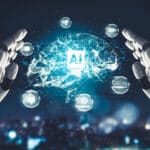2024 Paris Olympics -- cybersecurity risks and top tips to keep data safe [Q&A]

In recent years, mobile devices have taken center stage and we've become mobile-first users, where mobile devices are our first choice for how we communicate, navigate, work, bank, take photos, shop and stay informed about the world around us. Our increased reliance on mobile phones is not without its risks.
According to Zimperium's Global Mobile Threat Report 2023, 43 percent of all compromised devices were fully exploited (not jailbroken or rooted), an increase of 187 percent year-over-year, a shocking number.
How DevOps teams can get ready to explore DORA [Q&A]

It's essential for businesses to get security, privacy and governance right -- not only to prevent breaches, but also comply with increasing numbers of regulations.
DevOps Research and Assessment (DORA) best practices are the gold standard for spotting vulnerabilities across both cloud and mainframe environments and improving development efficiency.
The impact of generative AI cybersecurity [Q&A]

Since ChatGPT's launch in 2022, there's been an explosion of speculative use cases for generative AI in the workforce -- and concern from the cybersecurity community over an unproven, unvetted, and potentially powerful new tool.
How have those concerns played out in the real world? We sat down with Nick Hyatt, director of threat intelligence at Blackpoint Cyber, to hear about the reality of generative AI's risk to the modern workplace.
Why mobile connectivity is essential for the enterprise [Q&A]

While enterprise computing was once tied to the desktop, theses days mobile connectivity is essential to the smooth running of any business.
This is partly as a result of changed working patterns -- accelerated by the COVID pandemic -- and partly down to rapidly evolving technology. We spoke to Allwyn Sequeira, CEO of mobile cloud service Highway 9 Networks, to learn more about the enterprise mobile space.
Forensics or fauxrensics? What to look for in cloud forensics and incident response [Q&A]

The rapid deployment of cloud resources has led to misconfigurations and security risks, leaving security teams scrambling to adapt and secure their businesses following migrations away from traditional on-premises environments.
Despite successfully enhancing prevention and detection in the cloud, organizations now face a significant challenge in assessing the true scope and impact of issues that do arise.
Why organizations must address the AI skills gap [Q&A]

As AI sees wider adoption, the demand for skills surrounding the technology inevitably increases too. By failing to act to address this AI skills and leadership vacuum organizations could be taking a significant risk.
We spoke to Arun 'Rak' Ramchandran, president and global head -- GenAI consulting and practice, hi-tech and professional services at Hexaware, to find out more about the problem and how it can be tackled.
How AI is changing the customer service experience [Q&A]

Artificial intelligence is having an impact on more and more areas of our lives. In the customer service field it's increasingly being used to improve customer experience and create more effective interactions.
But how good is AI at dealing with customers? And are businesses using it effectively? We spoke to Josh Kim, co-founder and CEO of AI-based chat and customer experience platform Channel Talk, to learn more.
How AI is changing the role of enterprise developers [Q&A]

Artificial intelligence is making its way into many areas of business and IT. Software development is just one area where it's starting to have a major impact on productivity and working patterns.
To learn more we spoke to Varun Mohan, CEO of AI coding assistant Codeium, which uses proprietary large language models (LLMs) to aid with software development and has recently announced a $65 million funding round.
How RISC-V is changing the server market [Q&A]

Data centers have a strong emphasis on performance and delivering workloads whilst remaining power efficient.
In order to deliver on these aims the open instruction set architecture RISC-V is increasingly being used as an accelerator in data centers since it offers a lot of flexibility, which is especially important with AI. We spoke to Ian Ferguson, senior director at SiFive to discuss why this technology has become key to the server market.
How the IT infrastructure landscape is evolving [Q&A]

Earlier this year the MACH Alliance published new research looking at the evolving landscape of IT infrastructure, highlighting the growing importance of MACH technologies.
We spoke to Casper Rasmussen, MACH Alliance president, to find out about the key trends, insights, and implications shaping the digital landscape in 2024 and beyond.
How risk profiling can help prevent cyberattacks [Q&A]

Recent cyberattacks like Volt Typhoon, BlackCat ransomware syndicate, and NuGet serve as stark reminders of the critical importance of monitoring cyber risks as these attacks could all have been prevented.
We spoke to Randy Watkins, chief technology officer at Critical Start, to discuss why organizations must know the difference between cyber risks and threats, and how those enterprises that fail to mitigate against cyber risk will remain reactive, and ultimately fall behind their competitors.
Shadow SaaS -- a persistent problem and how to confront it [Q&A]

There's an abundance of apps and SaaS solutions readily available these days to make the lives of employees easier and perform many work-related tasks. And the list keeps growing, with the likes of ChatGPT and Gemini paving the way for more AI-driven virtual assistants.
This is all well and good, unless your organization doesn't sanction the use of the software in question, turning something seemingly innocuous into shadow SaaS -- and a security risk. We spoke to John Stringer, head of product at data loss prevention specialist Next DLP, to learn more.
The latest cybersecurity trends and how to guard against them [Q&A]

The cybersecurity landscape is a constantly changing one, with new threats emerging and old ones evolving. This makes it difficult for organizations to ensure their defenses are up to the task of properly protecting them.
We spoke to Balazs Greksza, threat response lead at Ontinue which recently published its first threat intelligence report, to find out about the latest threats and how organizations can address them.
AI and dataset poisoning -- are organizations prepared for the latest cyberthreats? [Q&A]

Although governments are issuing new guidelines for businesses to toughen up their cyber protection, cyberattacks remain a major risk, only growing in sophistication with advancements in AI.
With the continued integration of AI into systems, recognizing the threat that dataset poisoning presents is also an emerging concern. We spoke to Andy Swift, cyber security assurance technical director at Six Degrees to discuss the latest threats and how businesses can respond.
Adapting service and consultancy businesses to the boom in AI use [Q&A]

As more companies look to embrace AI technology, professional services and consultancy providers must make sure they're ready to help their customers respond to the opportunities that it presents. Indeed, professional services teams also need to look at how using AI in their own organizations can help them to adapt as well.
But how can they ensure that they take full advantage of what is on offer, and not just fall foul of the latest hyped technology trend? We spoke to Andy Campbell, director, solutions marketing at Certinia, to find out.
Recent Headlines
BetaNews, your source for breaking tech news, reviews, and in-depth reporting since 1998.
© 1998-2025 BetaNews, Inc. All Rights Reserved. About Us - Privacy Policy - Cookie Policy - Sitemap.